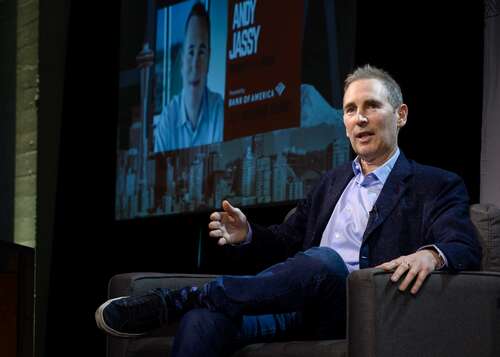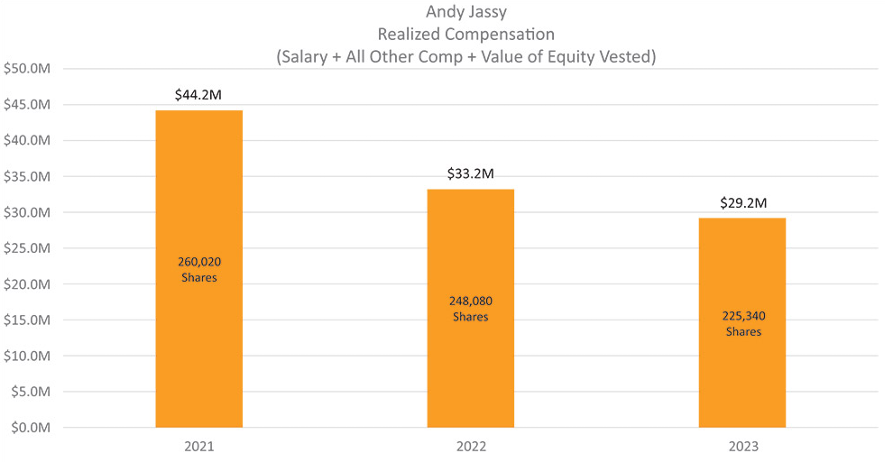
Amazon CEO Andy Jassy’s compensation for 2023 totaled $29.2 million, including his base pay, the value of shares that vested during the year, and security costs, according to a new filing by the company.
That was down 12% from $33.2 million in compensation in 2022. The drop was primarily due to the decline in Amazon’s share price last year (especially earlier in the year, when many of Jassy’s shares vested) and the fact that he had fewer shares vest in 2023 than in 2022.
- Jassy’s base pay rose 15% to 365,000 in 2023, up from $317,500 in 2022.
- He realized value of $27.8 million from shares that vested in 2023.
- Amazon spent $986,164 on security costs for the CEO in 2023.
Those figures, disclosed in Amazon’s proxy statement Thursday morning, are what’s known as realized compensation, meaning the value of compensation the executive received during the year.

They differ from SEC-prescribed compensation calculations, which include the year-over-year change in the value of shares granted to the executive, including shares that vest during the year and those that will vest in the future.
By that method, which the SEC calls “Compensation Actually Paid,” Jassy’s compensation was $109.6 million in 2023, as reported in the company’s proxy statement. Most of that came from the increase in the value of shares that haven’t vested, due to a subsequent increase in Amazon’s shares as of the end of 2023.
Using that same method, Jassy’s compensation was reported by Amazon as a negative $147.7 million in 2022, due to the decline in Amazon’s shares last year, illustrating the challenge of relying on the SEC’s approach for an accurate picture of a CEO’s compensation in a given year.
Jassy’s compensation has come under scrutiny since he received a one-time special stock award upon becoming CEO in 2021, valued at nearly $212 million at the time.
That stock vests over 10 years, most of it between five and 10 years after Jassy became CEO. In the proxy statement, Amazon’s board reiterated that the special stock award was “was intended to represent most of his compensation in the coming years.” Jassy did not receive additional stock awards in 2022 or 2023, the company said in its filing Thursday.
Among other concerns, shareholders have questioned why the vesting of Jassy’s stock-based compensation wasn’t conditioned on achieving specific goals.
Institutional Shareholder Services, an investor advisory firm, at the time called the stock award to Jassy “excessive in the context of an internal promotion,” saying it lacked “any connection to objective, pre-set performance criteria.”
At Amazon’s shareholder meeting in 2022, less than 56% of votes cast in an advisory vote on executive pay supported the company’s compensation of Amazon’s named executive officers. That was down from 81% the year before. At last year’s meeting, the approval rating increased to 68%.
“Given the long-term vesting conditions on Mr. Jassy’s 2021 restricted stock unit award, his compensation is fully aligned with our long-term stock price performance,” Amazon said in its proxy statement last year, describing a series of conversations with investors about the issue.
Fortune reported March 27 that many Amazon senior managers and leaders won’t get cash raises this year. Jassy’s increase in base pay for 2023 coincided with a prior increase in base pay for Amazon executives.

